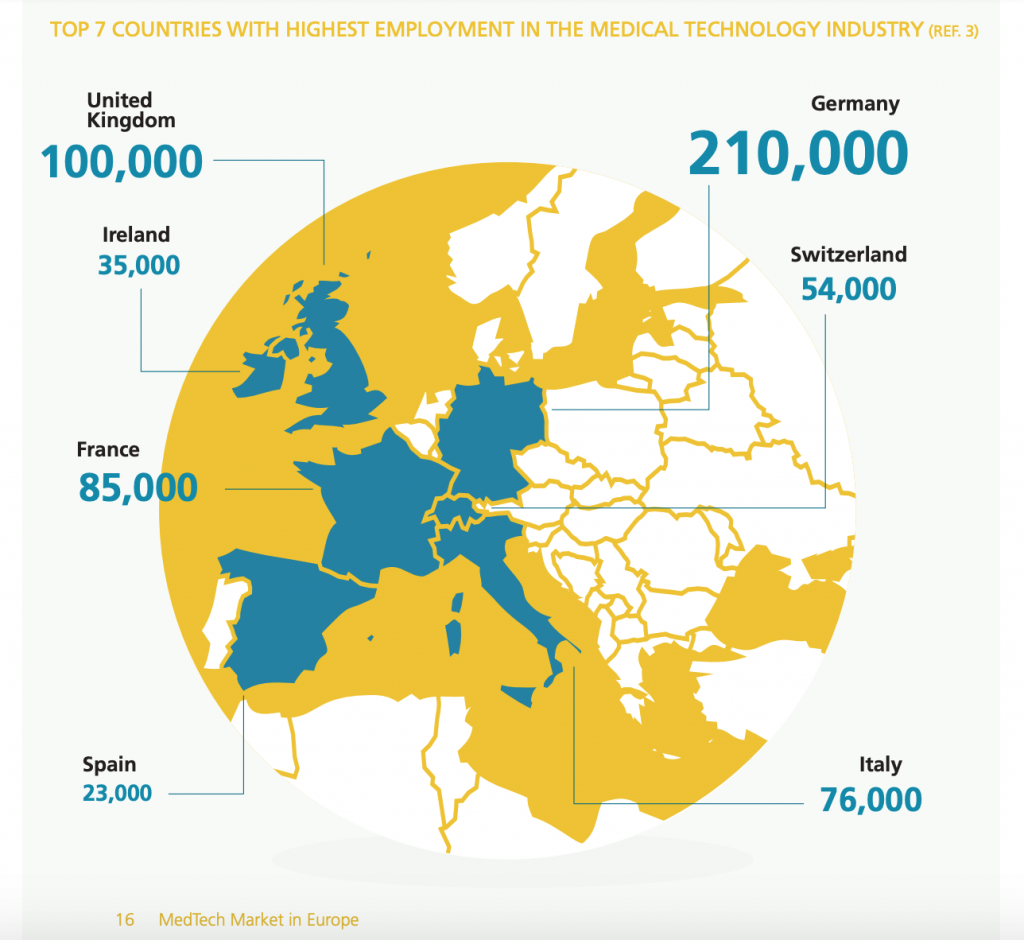Table of Contents
Medical technology, or “medtech” are intended to improve the quality of healthcare delivered through earlier diagnosis, less invasive treatment options and reduction in hospital stays and rehabilitation times. Medical technology or MedTech may include medical devices, information technology, biotech, and healthcare services. According to Statista, the whole global medical technology industry’s market size stands at some 430 billion U.S. dollars. Established centers of this MedTech industry include the United States and Western Europe. But MedTech industry trends show that Asia and first of all China, are about to play a more prominent role in the years to come.

Source: Medtech Europe
Right now thwre are 27,000 medical technology companies in Europe. Most of them are based in Germany, followed by the UK, Italy, Switzerland, France and Spain. Small and medium-sized companies make up almost 95% of the MedTech industry, the majority of which employ less than 50 people.
So, what have these companies came up with? Let’s look at the top MedTech industry innovations that we would definitely keep an eye on.
MedTech industry innovations
High-tech imaging
MRI (magnetic resonance imaging) is an advanced imaging technique. The body part to be examined is placed inside a powerful magnet, and harmless radio waves are released towards it. A computer then builds an image by analysing the pattern of radio waves returned from the part. MRI is often used to examine the brain and other soft tissues.
Modern imaging methods can provide detailed pictures of body parts, whether by injecting dyes that highlight specific structures on X-ray viewing, or by using methods that provide cross-sectional or 3-D scans. Some techniques provide information on body activity, not just structure. For example, special forms of ultrasound can be used to monitor the flow of blood within blood vessels. The internal structures of the body can also be examined directly by means of fibreoptic endoscopes.
Laser surgery
Laser beams are used as cutting and burning tools in various types of surgery, including eye surgery. A laser can be used to treat disease of the retina at the back of the eye and to reshape the cornea for treating short-sightedness. Lasers are also used to treat some skin conditions, such as birthmarks, and to remove tattoos.
3-D Printing
When looking specifically at the MedTech industry, 3D printing has quickly become one of the most popular technologies for new startups as well as established corporations. In recent years, these printers have been used for the creation of artificial joints that can be administered during surgery as well as patient-specific implants, the latter of which includes everything from shoulder implants to hip implants.
Wearable Technology & Health Monitoring
Wearables provide real-time data to smartphones via easy-to-use applications. These devices can monitor everything from a person’s physical fitness and sleeping patterns to their heartbeat and steps, which allows such technology to be used for a variety of medical and health purposes.
Robotic Surgery
In recent years, robotic surgery and operating assistance have been extremely useful within the MedTech industry. These machines are predominantly applied to minimally-invasive surgical procedures, which provides patients with the opportunity to receive a life-saving surgery that doesn’t come with as many risks as something like open surgery. The usage of robotic surgery helps with control, flexibility, and precision during the procedure at hand, which lessens the chances that a mistake is made.
AI Technology
It has already become a driving force for innovation within the MedTech industry. Artificial intelligence involves the ability for machines to learn, adapt, and evolve from experience much in the same way that a human can. In regards to the MedTech industry, AI technology is already being used to monitor health statuses, schedule appointments based on symptom severity, and notify nurses instantly about notable changes in a patient’s health.
Virtual Reality
Both virtual reality and augmented reality have been used in an increasingly high number of surgical operations to assist doctors and surgeons with picturing what they’re doing. Both of these device types provide the surgeon wearing the device with a three-dimensional image of the patient, which allows them to operate more efficiently and effectively. These devices are also being used to help medical trainees visualize what they’re doing.
Digital Healthcare Services
Today’s world is driven by technology, which is why the majority of people prefer digital healthcare services that can be conveniently accessed whenever necessary without waiting to book a face-to-face appointment. This technology is improving with each passing day and is already available through a variety of personalized mobile applications.
Ok, now, it’s time to look at the booming startups that drive changes in MedTech industry.
Top Medtech startups that revolutionise MedTech industry
Here are MedTech startups developing and implementing cutting-edge technologies in the MedTech industry to improve the quality of life for patients around the globe.
1.DNA Script
DNA Script manufactures synthetic DNA for research purposes, using a proprietary template-free enzymatic technology. This technology has the potential to greatly accelerate advances in drug discovery, regenerative medicine, as well as agtech and DNA data storage.
2. Mecuris
Mecuris is digitizing prosthetics and orthotics using 3D printing. Physicians and orthopaedic technicians are empowered to 3D-print patient-specific prostheses and orthoses without prior 3D design or 3D printing experience. The company’s platform uses patient images (CT, MRI, or 3D scans) to semi-automatically individualize 3D designs of patient aids and make them ready-to-print at a local 3D printing hub, enabling a 100% customized fit, and cutting production times by 75% for the medical practitioners and patients.
3. Genomtec
Genomtec has developed a mobile laboratory device for disease diagnosis. In only 15 minutes, it can identify dangerous pathogens including viruses, bacteria and fungi by amplifying and detecting specific DNA and RNA fragments. Diagnoses using Genomtec ID can be performed both in humans and animals, and can be used by hospitals, doctors, laboratories.
4. FibriCheck
FibriCheck has developed a smartphone app to measure your heart rhythm, and help determine conditions such as cardiac arrhythmias or risk of stroke. Cardiologists, neurologists, and practitioners are already prescribing the app to their patients, who only need to place their finger on their smartphone for one minute to receive results, which can then be sent to their doctor for analysis.
5. ABLE Human Motion
ABLE Human Motion is a medical device spin-off from Universitat Politécnica de Catalunya that is developing ABLE, the first lightweight, easy-to-use, and affordable exoskeleton for people with spinal cord injury and lower-limb paralysis that restores the ability to walk naturally and intuitively. It helps to palliate health issues caused by a sedentary lifestyle while boosting self-confidence and independence.
6. RTsafe
RTsafe has developed solutions to personalize the quality assurance process in radiation oncology, where the treatment can be first checked in a simulation before being used on the real patient. Using 3D printing, the startup can create exact anatomical replicas of patients’ body parts in order to test the impacts of radiation and minimize the chances of side effects.
7. PredictImmune
PredictImmune develops prognostic tests to guide treatment options and improving patient outcomes for immune-related diseases such as inflammatory bowel disease (IBD), Crohn’s disease, and lupus.
8. Symptoma
Using their search engine, physicians can enter symptoms, gender, and the age of the patient to help diagnose them and find medical information about the disease that they may have.
9. Lung Passport
Lung Passport sends you a digital stethoscope which is used with their app to help monitor your lung condition. One can find out if they just have a persistent cold or something more serious such as a chronic disease.
10. Confo Therapeutics
The drug discovery company uses its advanced technology to discover GPCR agonists, and create therapeutic programs in different disease areas.
11. Booknowmed
Tourists or locals can use booknowmed to find and book dialysis treatments around the world, using their IT and automation systems to help patients book appointments with the treatments centers.
12. Liva Healthcare
The Liva platform offers to track (e.g. of steps, sleep, or diet) and health coaching personalized to each patient. Coach and patient communicate on how to best tackle chronic illnesses.
13. Optofluid Technologies
The company has built sensors that can monitor, in real time and online, the quality of dialysis.
It uses a method for detecting toxic waste removal from blood and allows users to adjust their treatment accordingly.
14. Oura
Using the Ōura ring and app, users can improve their sleep. The ring uses sensors to track different activity, body temperature, movement, etc.
15. Medilync
Medilync has built a cloud-based platform using AI, Machine Learning, and Big Data. This allows for easier disease self-management for diabetic patients and facilities communication between doctors and patients.
16. Atlantic Therapeutics
The company has created a non-invasive pelvic floor exerciser which strengthens the pelvic floor muscles and modulates the nerves. This can be used to treat different disorders or dysfunctions in the pelvic area.
17. Patch AI
Patch is a virtual assistant used in clinical trials to help collect data in real time. The platform engages the patient by mimicking real human conversations. It can also evaluate clinical trial performance.
18. Aidence
Using deep learning AI, Aidence allows computers to analyze medical images and provide detailed reports for treatment of lung cancer
19. Coala Life
The Coala heart monitor allows you to analyze your heartbeat and ECG. This information is displayed on the companion app. This can be used to detect heart diseases and treat them early.
20. Bookimed
Bookimed is a medical center aggregator, with the platform including 320 of the top global hospitals. The clinics are sorted based on the treatments they offer. Their aim is to offer various medical solutions, which are verified by patient reviews. They are a first mover in medical tourism.
21. Congenica
Congenica offers a diagnostic decision support platform. It allows medical professionals to analyze genomes accurately.
22. Grail
Several studies have shown that cancer patients have higher rates of survival if diagnosed in the very early stages of the disease. But effective screening tools are available for only certain types of cancer and many deadly cancers are often detected when it’s too late to be cured. Grail is trying to positively impact those statistics with their pioneer technology. Using machine-learning algorithms and population-scale clinical studies, the company developed a next-generation sequencing (NGS) blood-sampling device that can detect multiple deadly cancer types from a single blood draw.
23. Verge Genomics
Verge Genomics created a platform which uses AI to analyze hundreds of genes at the root of neurodegenerative diseases and predict effective drugs, thus accelerating the drug discovery process.
24. AbiliTech Medical
For people affected by neuromuscular conditions, basic daily activities from feeding and grooming, to using a computer are a constant struggle. But AbiliTech Medical is working on building a device that will allow these patients to regain control of their arm muscles and, subsequently, their independence.
Recent innovations in Medtech industry have not only helped accelerate the growth but have also helped create technology that will improve the lives and medical care for generations to come.
Author
-
Ekaterina Novoseltseva is an experienced CMO and Board Director. Professor in prestigious Business Schools in Barcelona. Teaching about digital business design. Right now Ekaterina is a CMO at Apiumhub - software development hub based in Barcelona and organiser of Global Software Architecture Summit. Ekaterina is proud of having done software projects for companies like Tous, Inditex, Mango, Etnia, Adidas and many others. Ekaterina was taking active part in the Apiumhub office opening in Paseo de Gracia and in helping companies like Bitpanda open their tech hubs in Barcelona.
View all posts










One Comment
Fahmid
Great post!